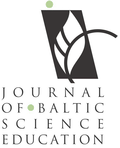EXPLORING THE EFFECTS ON FIFTH GRADERS’ CONCEPT ACHIEVEMENT AND SCIENTIFIC EPISTEMOLOGICAL BELIEFS: APPLYING THE PREDICTION-OBSERVATION-EXPLANATION INQUIRY-BASED LEARNING MODEL IN SCIENCE EDUCATION
| Title | EXPLORING THE EFFECTS ON FIFTH GRADERS’ CONCEPT ACHIEVEMENT AND SCIENTIFIC EPISTEMOLOGICAL BELIEFS: APPLYING THE PREDICTION-OBSERVATION-EXPLANATION INQUIRY-BASED LEARNING MODEL IN SCIENCE EDUCATION |
| Publication Type | Journal Article |
| Year of Publication | 2021 |
| Authors | Zhao, L, He, W, Liu, X, Tai, K-H, Hong, J-C |
| Journal | Journal of Baltic Science Education |
| Volume | 20 |
| Issue | 4 |
| Start Page | 664-676 |
| Pagination | Continuous |
| Date Published | August/2021 |
| Type of Article | Original article |
| ISSN | 1648-3898 |
| Other Numbers | E-ISSN 2538-7138 |
| Keywords | inquiry-based learning model, light refraction, prediction-observation-explanation, science education, scientific epistemological beliefs |
| Abstract | The inquiry-based learning model can facilitate students’ understanding of scientific concepts. Scientific epistemological beliefs (SEBs) are related to students’ beliefs about the nature of the process of knowledge in science education. However, whether the “prediction-observation-explanation” (POE) inquiry-based learning model can facilitate fifth graders’ concept achievement and SEBs in science education has not been extensively studied. This study selected the unit of Light Refraction to explore the effects of POE learning on fifth graders’ science concept achievement and SEBs. The Light Refraction Test and Scientific Epistemological Beliefs measurement were applied to the two groups prior to and following the experiment. The experimental group (N=86) participated in POE inquiry-based learning, whereas the control group (N=88) participated without POE inquiry-based learning. The results revealed a significant difference between the two groups, with the experimental group learners performing better than the control group in the concept achievement. In addition, the results showed better positive effects of POE on experimental group learners’ SEBs in the scales of Source and Certainty. Findings suggested that learners achieved better concept achievements and SEBs with the approach of POE inquiry-based learning, which pointed to certain implications for inquiry-based teaching, as well as in education of future science instructors. |
| URL | http://oaji.net/articles/2021/987-1629707839.pdf |
| DOI | 10.33225/jbse/21.20.664 |
| Refereed Designation | Refereed |
| Full Text |
